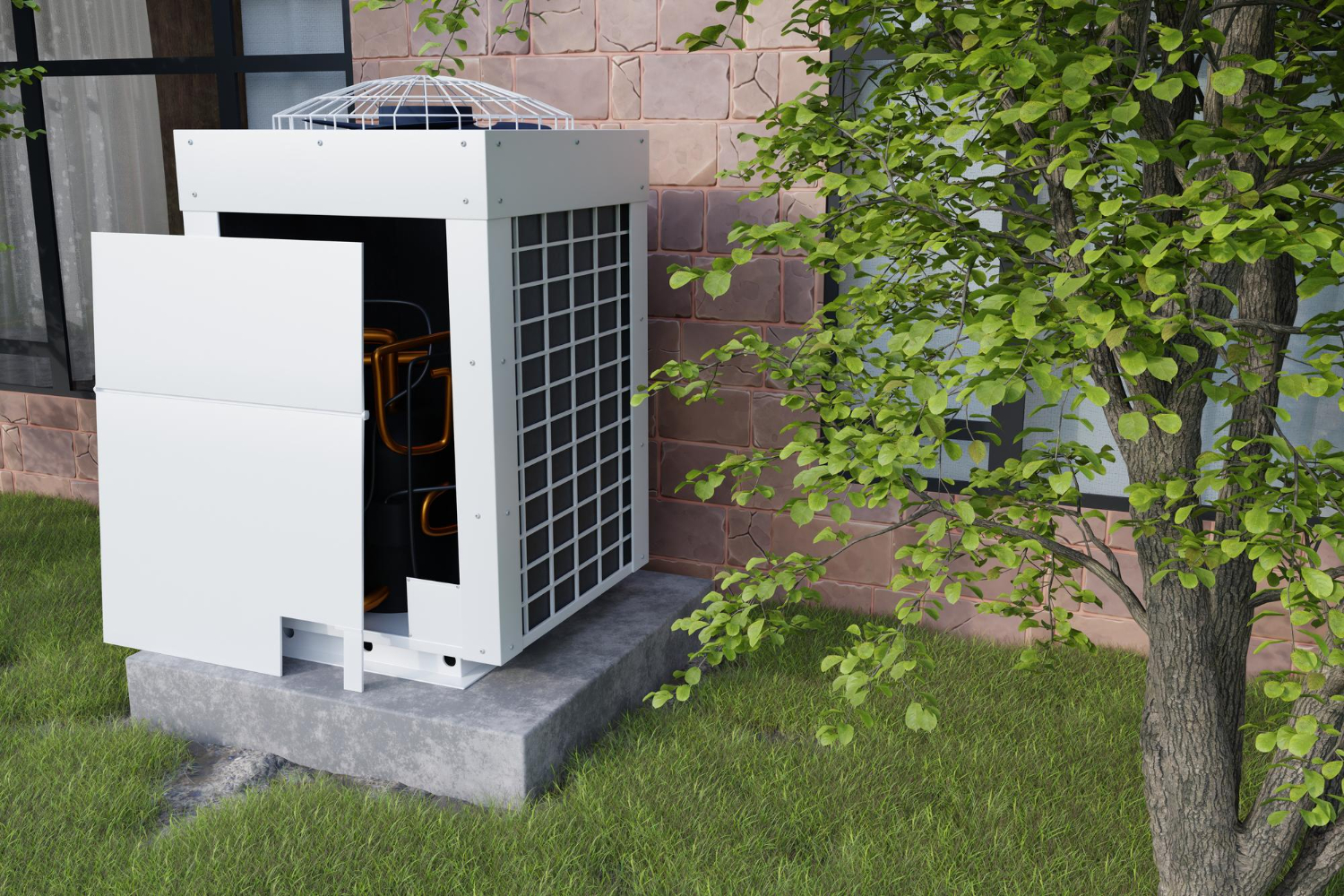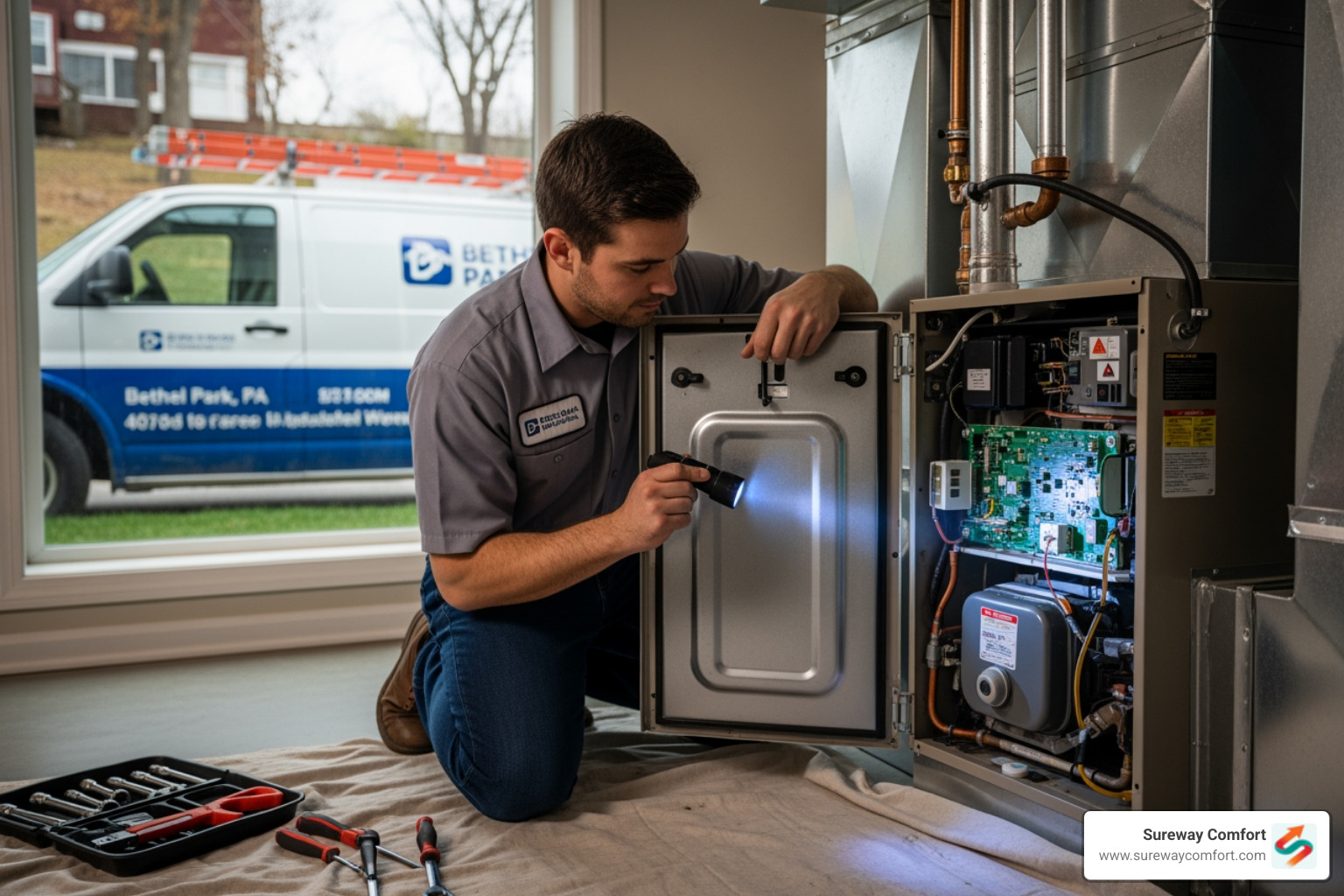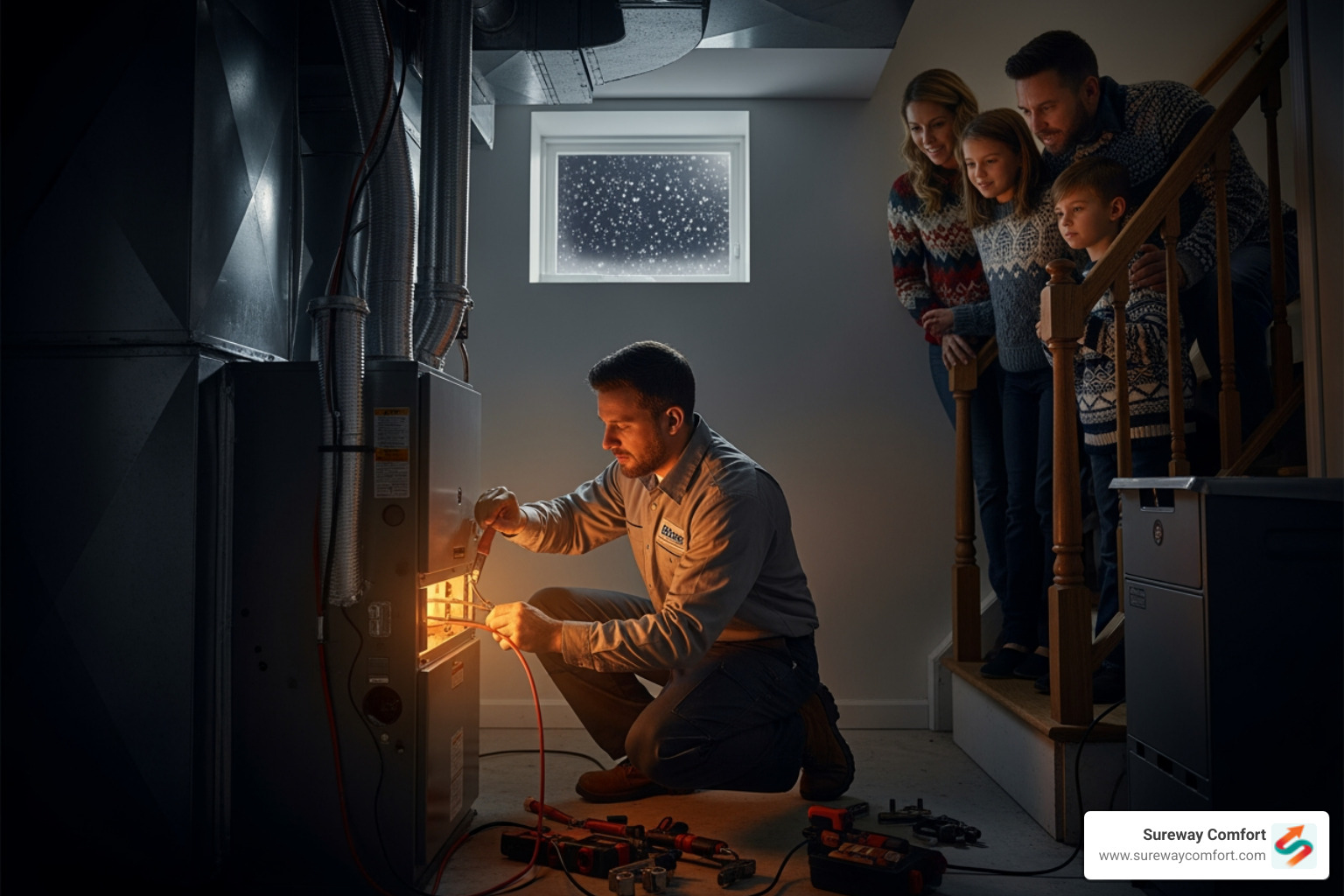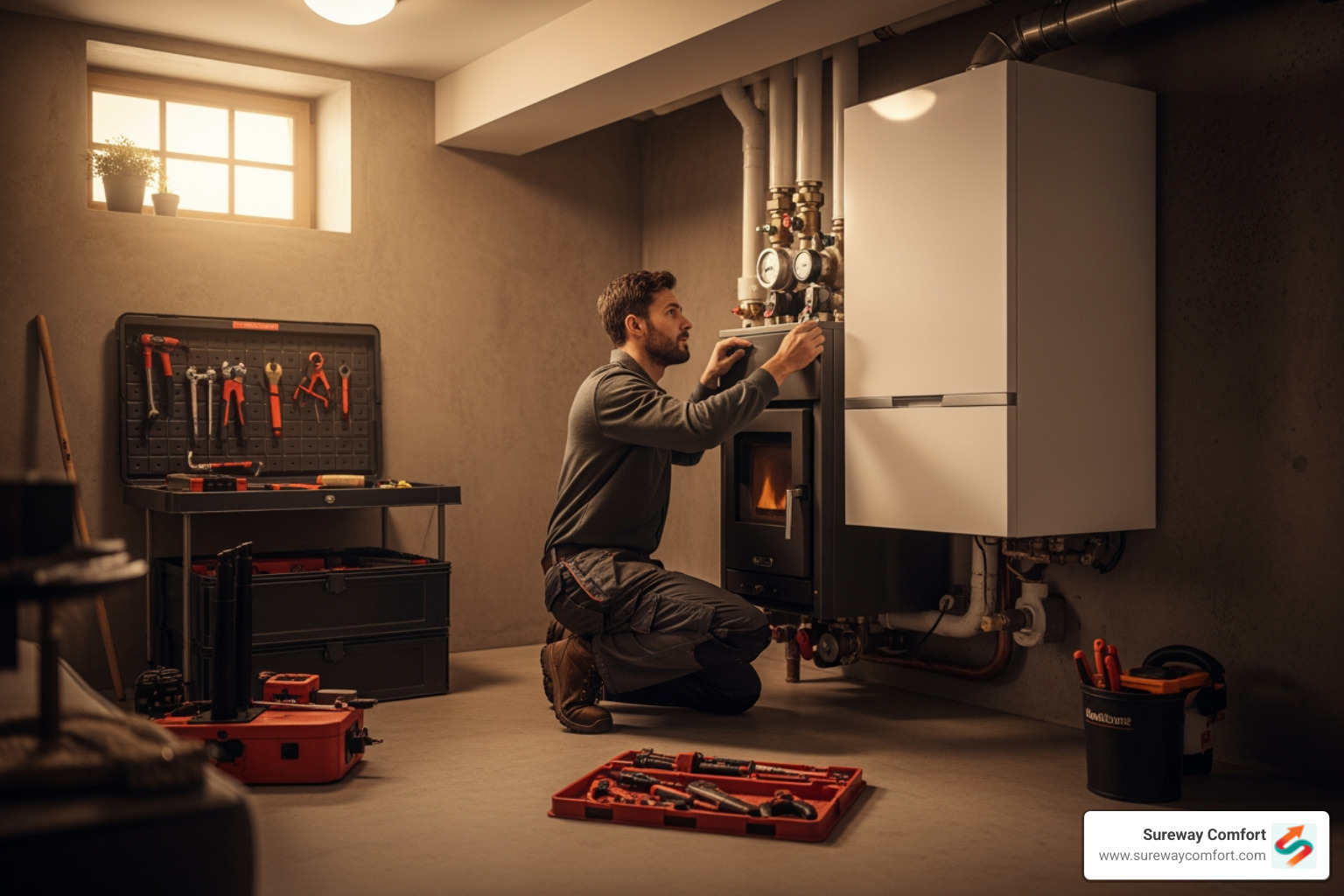Summer temperatures in Canonsburg can put your air conditioner to the test. While most homeowners pay attention to whether cold air is flowing, it is easy to miss how well the AC system is draining moisture from the air. When that drainage system is not working properly, your unit may start leaking, stop cooling efficiently, or even shut down entirely. All of this becomes more frustrating when indoor comfort starts dropping, especially during heatwaves.
Whether you are seeing puddles near the air handler or noticing a musty smell, drainage problems in your AC system are not limited to old units. Even newer systems can get blocked or misaligned. Without proper maintenance, small plumbing issues can lead to larger failures. Knowing what to look for and when to act is the first step toward stopping these problems before they interrupt your comfort at home.
Common AC Drainage Issues
Drainage troubles often begin in parts of the AC system you cannot easily see. The evaporator coil pulls moisture from the air, which should drain into a pan and exit your home through the condensate line. When something interrupts that flow, water starts backing up. That is when issues begin appearing on your floor, ceiling, or even inside the unit.
Here are the most common AC drainage problems homeowners face in Canonsburg:
1. Clogged Condensate Drain Line
Over time, the condensate line can collect dust, mold, algae, or debris. When this line becomes blocked, there is nowhere for the water to go, so it collects in the drain pan and spills over.
2. Damaged Drain Pan
Drain pans can crack or corrode after years of exposure to moisture. A leaking pan may go unnoticed if located in a crawlspace or connected to ceiling-mounted units. Water escapes before it has a chance to drain properly.
3. Improper Slope or Installation
If the condensate line was not installed at the right angle, water will not drain properly. Even a small shift in angle due to home settling or renovations can cause pooling and backup near the unit.
4. Frozen Evaporator Coil
Drainage issues are not always the root cause. When coils freeze because of low refrigerant or poor airflow, they eventually thaw and release all that water at once, overwhelming the drainage setup.
5. Dirty Air Filter
Though it may not seem related, a clogged air filter restricts airflow, causing condensation to build up on the coils and overflow the drain pan.
Some homeowners in Canonsburg say they did not notice anything wrong until warm air began blowing from the vents or they saw water stains in the ceiling near their attic AC unit. It usually starts small, like a puddle or faint smell, then builds until immediate action is required.
Addressing the issue early helps avoid added damage such as warped floorboards, mold, or drywall stains. These problems do not correct themselves. Detecting them sooner makes them quicker and less expensive to fix.
Warning Signs of a Drainage Problem
You do not have to see water leaking to realize your AC system has a drainage problem. Often, small signs indicate that something is not flowing properly. If your system is running while humidity remains high or strange odors show up shortly after the system runs, it may be time for a closer look.
Watch for these common signs around your AC system:
- Pools of water near the indoor unit
- Musty or damp odors coming from vents
- Mold or algae growing around the drain pan or line
- AC shutting off before reaching the set temperature
- More humidity in the air even while the AC is running
- Unusual water stains near ceiling vents or in the attic
Any of these can signal drainage issues. The more signs you notice, the more likely water is not flowing as it should. Moisture build-up can damage more than the AC unit. It can lead to structural damage or mold growth that spreads outside the HVAC system.
Ignoring these signs can lead to larger, more expensive repairs. If you notice recurring leaks or strong odors from your system, treating it as a drainage issue gives you a chance to address the problem early and maintain indoor comfort throughout the season.
Troubleshooting Tips for AC Drainage Problems
Homeowners in Canonsburg trying to stay on top of AC issues during summer can benefit from recognizing drainage trouble early. While most problems should be addressed by trained professionals, there are steps you can take to spot minor issues before they get worse.
Here are a few things you can do:
- Check and replace your air filter regularly. A clogged filter restricts airflow, triggering condensation buildup on the coils and leading to overflow. Replace your filter every one to three months, depending on manufacturer recommendations.
- Look for standing water at the base of the indoor unit. Even a small puddle may indicate a blocked or moved drain line.
- Check the condensate line outlet outside your home using a flashlight. If it is not dripping regularly when the unit is on, it may be clogged.
- Inspect the drain pan. A pan that is rusted, cracked, or dirty may have stopped containing and directing water correctly.
- Pay attention to smells. Musty or moldy odors from vents usually mean water has been sitting in the drain system too long.
- Listen for the drain pump, if your system has one. Loud or unusual noises may indicate it is not working as it should.
Regular air filter changes and spotting surface signs help, but most drainage areas are hidden behind panels or insulation. Homeowners should not attempt to flush or disassemble these parts on their own. If you spot signs of leaking, moisture, or poor performance, getting help early can save you from larger issues and repair bills later.
Why Ongoing Maintenance Matters
Waiting until drainage issues cause visible damage often results in higher repair costs—not just for AC systems but for floors, walls, or insulation. Regular maintenance keeps these problems from escalating and helps the entire system last longer.
Maintenance appointments allow our technicians to catch issues that most Canonsburg homeowners may not notice. During a visit, our technicians will check the condensate line for buildup, inspect the drain pan for corrosion, and review refrigerant levels and air filters. All of these checks help prevent overflows and keep systems running efficiently.
Here is how professional maintenance directly helps with drainage:
- Drain lines are cleared before they can clog
- Drain pans are examined for unseen cracks and rust
- Pumps, where installed, are tested for performance
- Air filters are replaced to maintain airflow
- Coils are cleaned to reduce freeze risk and overflow
In homes with attic AC units, which are common across Canonsburg, leaking can damage insulation and ceiling areas without visible signs in the living area. Regular inspection and maintenance ensure these systems are kept in good shape before any water-related damage occurs.
Keeping Homes Comfortable in Canonsburg
Air conditioning drainage problems affect more than the unit itself. When unresolved, they allow unwanted moisture into the home, increase odors, and make your HVAC system work harder. What starts as a small issue can lead to logged repairs and indoor discomfort.
Canonsburg homes face heat and humidity throughout the summer months. That makes a working AC system essential. If your system runs often during peak days, backup or drainage problems become more common. Catching early signs or staying ahead with seasonal maintenance helps prevent damage before it spreads.
By paying attention to new smells, small puddles, or reduced system performance, you can preserve your household comfort throughout the summer. Address drainage problems before they grow, and bring in our technicians early to keep your system clean, safe, and operating efficiently.
With high summer temperatures in Canonsburg, addressing AC drainage issues quickly can prevent costly water damage and keep your home comfortable. The professionals at Sureway Heating Cooling Plumbing have the expertise to diagnose and repair these problems efficiently. If you are noticing water puddles, musty odors, or other unusual signs, consider scheduling expert AC repair in Canonsburg to restore your system’s performance. For a quick estimate or to schedule service, please contact us today.




























.avif)



